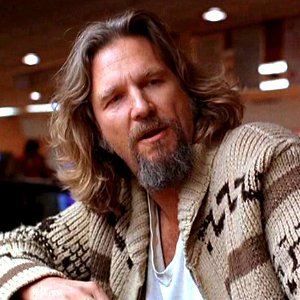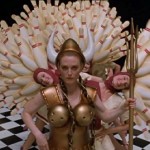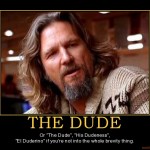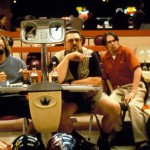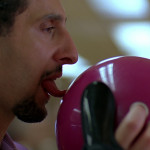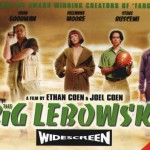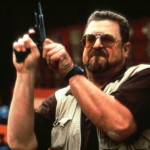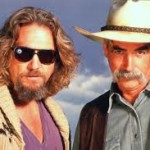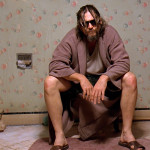The Big Lebowski is a cool cult movie by a cool team (the Coen brothers, they of Inside Llewyn Davis fame) about a cool dude who calls himself The Dude (AKA Jeff Bridges), but, critically, shares the name Lebowski with a rich dude. In fact, this is a movie populated with many larger-than-life and eccentric characters who bounce off one another to riotous effect with the help of a delicious Coens script and some great fun with ten-pin bowling. It’s a sort of comedy but not necessarily the sort of comedy that makes you laugh continuously, though I often do.
The plot, a criminal farce involving mistaken identity and blackmail, is almost irrelevant by comparison, but so well observed are the characters that that doesn’t matter a whole deal. But then each performance is a minor gem, demonstrating the benefits of a long rehearsal period and the method school to understand totally every aspect of the character.
For example, where The Dude is laid back to the point of being horizontal, John Goodman‘s uptight Walter Sobchak, replete with yellow tinted glasses, is a creation of comic genius. Walter has a serious issue with anger management; I mean SERIOUS issue. He pulls a gun in a bowling match and you truly believe he would use it too. This is the performance of a lifetime by Goodman – I defy you to find better, even with such a ubiquitous actor. The late great Philip Seymour Hoffman turns up as an ineffectual aide to David Huddleston‘s Big Lebowski. In fact, I think all the characters deserve their turn in the spotlight, courtesy of Wikipedia:
-
Jeff Bridges as Jeff “the Dude” Lebowski, a single, unemployed slacker living in Venice, California. The film’s protagonist, he enjoys marijuana, White Russians, and bowling. Bridges had heard or was told by the Coen brothers that they had written a screenplay for him. The Dude is mostly inspired by Jeff Dowd, a member of the anti-war radical group the Seattle Liberation Front (The Dude tells Maude Lebowski during the film that he was one of the Seattle Seven, who were members of the SLF). A friend of the Coen brothers, Vietnam War veteran Pete Exline, also inspired aspects of the character. He actually found a twelve-year-old’s homework in his stolen car.
- John Goodman as Walter Sobchak, a Vietnam veteran, the Dude’s best friend, and bowling teammate. Walter places the rules of bowling second in reverence only to the rules of his adopted religion, Judaism, as evidenced by his strict stance against “rolling” on Shabbos. He has a violent temper, and is given to pulling out a handgun (or crowbar) in order to settle disputes. He says the Gulf War was all about oil and claims to have “dabbled” in pacifism. He constantly references Vietnam in conversations, much to the annoyance of the Dude. Walter was based, in part, on screenwriter John Milius.
- Steve Buscemi as Theodore Donald “Donny” Kerabatsos, a member of Walter and the Dude’s bowling team. Naïve and good-natured, Donny is an avid bowler and frequently interrupts Walter’s diatribes to inquire about the parts of the story he missed or did not understand, provoking Walter’s frequently repeated response, “Shut the fuck up, Donny!” This line is also a reference to Fargo, the Coen brothers’ previous film, in which Buscemi’s character was constantly talking.
- David Huddleston as Jeffrey Lebowski, the “Big” Lebowski of the movie’s title, is a wheelchair-bound (he lost the use of his legs in the Korean War) apparent multi-millionaire who is married to Bunny and is Maude’s father by his late wife. The film’s primary antagonist, he refers to the Dude dismissively as “a bum” and a “deadbeat”, and is obsessed with “achievement”. Although he characterizes himself as highly successful and accomplished, it is revealed by Maude that he is simply “allowed” to run some of the philanthropic efforts of her mother’s estate, and that he actually doesn’t have money of his own.
- Julianne Moore as Maude Lebowski, an an avant-garde artist and feminist, whose work “has been commended as being strongly vaginal”. She introduced Bunny to Uli Kunkel. She beds the Dude solely to conceive a child, and wants nothing else to do with him. She is straightforward in manner, and has a very precise style of speaking.
- Tara Reid as Bunny Lebowski, the Big Lebowski’s young “trophy wife“. Born Fawn Knutsen (comically pronounced “Kuh-nootson”), she ran away from the family farm outside Moorhead, Minnesota, and soon found herself making pornographic videos under the name “Bunny La Joya”. According to Reid, Charlize Theron tried out for the role.
- Philip Seymour Hoffman as Brandt, the Big Lebowski’s personal assistant, who plays mediator between the two Lebowskis.
- Sam Elliott as The Stranger, an old-time cowboy, who is also the narrator, and who sees the story unfold from a third-party perspective. He has a thick, laid-back Texas accent. Towards the end of the film he is seen in the bar of the bowling alley, and converses directly with the Dude on two occasions. He expresses disapproval of The Dude’s use of profanity and his laziness, and adds the qualifier “parts of it anyway” when speaking to the camera commenting that he enjoyed the film.
- Ben Gazzara as Jackie Treehorn, a wealthy pornographer and loan shark, who lives in Malibu, and employs the two thugs who assault the Dude at the beginning of the film. Bunny owes him a large sum of money.
- Peter Stormare, Torsten Voges, and Flea play a group of nihilists, (Uli Kunkel, Franz, and Dieter, respectively). They are German musicians (Kunkel, as “Karl Hungus”, appeared in a porn film with Bunny), who, along with Kunkel’s girlfriend (Aimee Mann), pretend to be the ones who kidnapped Bunny. The character of Uli originated on the set of Fargo between Ethan Coen and Stormare, who often spoke in a mock German accent.
-
John Turturro as Jesus Quintana, an opponent of the Dude’s team in the bowling league semifinals. A Latino North Hollywood resident who speaks with a thick Cuban American accent, and often refers to himself in the third person as “the Jesus”, using the English pronunciation of the name rather than the Spanish. According to Walter, he is a “pederast” who did six months in Chino for exposing himself to an 8-year old. Turturro originally thought he was going to have a bigger role in the film; when he read the script, he realized the part was quite small. However, the Coen brothers let him come up with a lot of his own ideas for the character, like shining the bowling ball and the scene where he dances backwards, which he says was inspired by Muhammad Ali.
There you have all you need to know about the movie, including how it became a cult classic (it is included on this list.) Except that, just as with Pulp Fiction, it’s the sassy dialogue and interaction between various combinations of cast that keeps the pot boiling. Without these components it would be a very silly movie that was forgotten very rapidly – a decision made by original audiences, who steered clear in droves. Cult status demands quotable soundbites and images that stay long in the memory.
Oh yes, and music is important to cult status too. Just like Tarantino movies, Lewbowski is helped greatly in achieving cult status by the eclectic soundtrack, which takes in everything from Mozart‘s Requiem to Bob Dylan via Duke Ellington. Music comes no quirkier than the Gypsy Kings version of Hotel California, though in the context of the movie it works just fine – especially while rubbing shoulders with the likes of Captain Beefheart, Moondog and Henry Mancini.
Essential viewing if you haven’t already seen it, though whether you will pick up the cult status and watch repeatedly may say as much about you as it does about the movie.

